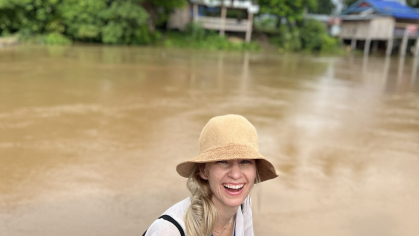Advocating for LGBTQ+ Rights: Rutgers Public Health Dean Speaks With Mentees During Pride Month

As dean of the Rutgers School of Public Health, Perry N. Halkitis, has mentored dozens of individuals during his nearly three decades as an infectious disease epidemiologist, applied statistician and public health psychologist.
Throughout his career, Halkitis has been on forefront fighting for the rights of those infected with and affected by HIV as well as being an advocate for the rights and health of LGBTQ+ people. A well-funded researcher, with numerous grants from the National Institutes of Health (NIH), Halkitis says “community-based research is research, as powerful as any bench or clinical science, and with much more immediate impact on the well-being of populations.”
Halkitis founded and directs the Center for Health, Identity, Behavior and Prevention Studies (CHIBPS), a nationally recognized research center for the study of LGBTQ+ health with a focus on the disparities and interplay of infectious diseases, substance use, and mental health burden. CHIBPS also is a training ground for behavioral and public health researchers, practitioners and activists.
During Pride Month, Rutgers Biomedical Health Sciences launched its directory of faculty who identify as LGBTQ+ and/or offer support and guidance to LGBTQ+ students as they navigate the path from scholarship to an enriching career.
Halkitis sat down with some of his mentees to discuss the importance of mentorship for LGBTQ+ individuals.
Halkitis: Why is it important for us to have individuals in academic leadership roles who are out and open about their sexuality and about their gender identity?
Rafael Pérez-Figueroa, associate dean of community engagement and public health practice: When I was a student of public health, I was clear that I wanted to explore health issues of sexual and gender minorities. Until I met Dr. Halkitis, I had never had the opportunity to have a professor that was like me. He was concerned about the health of sexual and gender minorities and understood it through his own perspective and experience.
He was part of the community and that was reflected in his commitment. It opened my mind about the idea that I can integrate who I am in the kind of work that I do and what does that represent for people like us.
Caleb LoSchiavo, doctoral student: I think very similar or similar to that. It's something that Dr. Halkitis exemplifies really well, is the importance of bringing one's full self as a sexual and gender minority person to their leadership. And I think so often as LGBTQ people doing work on LGBTQ communities, we're made to feel like we have to hide that part of ourselves or suppress that part of ourselves in order to come across as “objective” in our work and as not biased because of our own experiences with or concerns about the community.
And to have a mentor who is fully in his everyday life an out, proud, gay man makes space for me to do that. And through learning how to do that, I know that then I can be that kind of mentor in the future for other students.
Halkitis: Why is it important to you to mentor sexual and gender minority students and other colleagues?
Kristen Krause, instructor and deputy director of CHIBPS: I think for me in my own mentorship and providing mentorship over the last couple of years, it's been a lot of fun and eye opening in different ways. I think having the opportunity to teach different groups of students who have taken my LGBT Health course, who come in with different identities all across the spectrum, has taught me a lot.
But it also just feels good to be able to be that person for someone to understand that lived experience who haven't seen that representation in that same way and who haven't been able to have those interactions. I just I tell my students every time I start teaching that for me, it's a privilege to be able to be in that space with them, because not everyone gets that opportunity. And to be able to lead conversations in a thoughtful and meaningful way, I think is one of the most critical parts of mentorship.
Pérez-Figueroa: I totally agree that like it’s a privilege. In my experience, it's also a responsibility. I feel that I have had great mentors, and I have had this feeling about like how that have opened the door for me in my career. And when I think about those great mentors, in particular Dr. Halkitis, I think about something that I admire about working with him is that he led me through. He knows how to bring people to the table that have a variety of skills, a variety of perspectives. But he celebrates your uniqueness within that and cultivates you in a way that you can do your work and do your best work.
LoSchiavo: Like my colleagues, I also teach some of the classes in our school’s LGBTQ public health concentration. I have had so many students who I have taught and who I have mentored, who have expressed how grateful they are to have a teacher or a mentor who is also a queer person or a trans person. And that makes me so happy, but also makes me a little sad because part of what they're so excited and grateful about is because it's so rare. I think about how grateful I am for Dr. Halkitis and our relationship, but also how rare that is for me to have a mentor or professor who is also an out, proud, gay man. And I think that's one of the challenges, too, and part of why I hold it as such an important responsibility in teaching and mentoring these students is so that they can one day be mentors and teachers for future queer and trans people in academia, and so that for the next generation they can make it a less rare experience to have out, proud, queer, trans mentors.
Halkitis: Can you provide some advice for working with students and mentees who are members of a sexual and gender minority population?
Pérez-Figueroa: Being visible. This is a time in which we need to make our voices bigger, and we need to do that with a sense of responsibility. We need to put our ideas out there, right? Now, my advice for leaders and for students that want to lead is that: question everything.
We need to do things in different ways. My advice for students is to ask themselves how we can decolonize academia, how we can decolonize leadership. To me, leadership is about outlining a vision and getting others to participate in that vision. But what kind of visions do we want to bring to the table? What kind of process do we want? In that process of engaging others and making sure that they participate and that they play a role in changing society and changing our political systems: what approaches do we use? And how does that bring values to communities and populations that we care about? That is something that I spend a lot of time thinking about and hope that my mentees do the same.
Krause: Never stop learning. I'm always learning, especially within our community. As we start having these conversations about decolonization and what true inclusivity looks like, it also means my door isn't closed to having those opportunities. And if students are engaging with me in certain conversations that I'm listening and that I'm not being defensive or coming in as the know what the know it all, because I think that is kind of what happens in academia is sometimes where we think we're here, like, “OK, we've got nothing more to learn,” but I'm learning something new every single day.
So that's one piece of advice. I think the other is: When you're in this space to own the lived experience that you likely do have and understand that the questions that you might be developing from a research perspective or just from whatever perspective are valid, and that a lot of times as we like to say around here, “research is me-search” in a lot of ways. And so, going against the grain of that potential bias and knowing that, you know, those lived experiences do mean something. And they're just as important to kind of home in on and understand, because likely that's going to have a much more widespread impact on the community at large.


